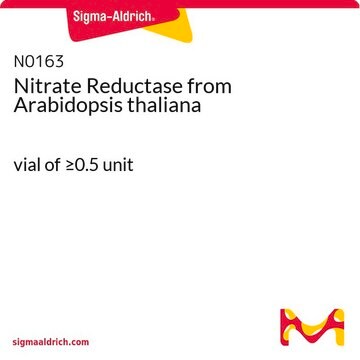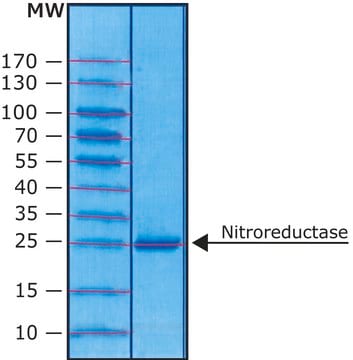N7265
Nitrate Reductase (NAD[P]H) from Aspergillus niger
lyophilized powder, ≥300 units/g solid
Synonym(s):
NAD(P)H:Nitrate oxidoreductase
Sign Into View Organizational & Contract Pricing
All Photos(1)
About This Item
CAS Number:
MDL number:
UNSPSC Code:
12352204
NACRES:
NA.54
Recommended Products
form
lyophilized powder
specific activity
≥300 units/g solid
shipped in
wet ice
storage temp.
−20°C
Looking for similar products? Visit Product Comparison Guide
General description
Nitrate reductase (NAD[P]H) is expressed in variety of organisms including bacteria, fungi, algae, and higher plants which have capacity to use nitrate as their sole source of nitrogen.Experimental studies show that nitrate reductase (NAD[P]H) is 180,000Daltons.
Biochem/physiol Actions
Nitrate Reductase (NAD[P]H) catalyzes the reduction of nitrate to nitrite. In addition, it also catalyzes the reduction of NADPH-cytochrome c, FADH2-nitrate. Nitrate reductase also has reduced methyl viologen-nitrate reductase activities.
Caution
light and moisture sensitive
Unit Definition
One unit will reduce 1.0 μmole of nitrate per min in the presence of β-NADPH at pH 7.5 at 25 °C.
Signal Word
Danger
Hazard Statements
Precautionary Statements
Hazard Classifications
Resp. Sens. 1
Storage Class Code
11 - Combustible Solids
WGK
WGK 3
Flash Point(F)
Not applicable
Flash Point(C)
Not applicable
Personal Protective Equipment
dust mask type N95 (US), Eyeshields, Gloves
Certificates of Analysis (COA)
Search for Certificates of Analysis (COA) by entering the products Lot/Batch Number. Lot and Batch Numbers can be found on a product’s label following the words ‘Lot’ or ‘Batch’.
Already Own This Product?
Find documentation for the products that you have recently purchased in the Document Library.
Customers Also Viewed
Nilesh Dharajiya et al.
The Journal of allergy and clinical immunology, 119(3), 646-653 (2007-03-06)
Ragweed extract (RWE) contains NADPH oxidases that induce oxidative stress in the airways independent of adaptive immunity (signal 1) and augment antigen (signal 2)-induced allergic airway inflammation. To test whether inhibiting signal 1 by administering antioxidants inhibits allergic airway inflammation
P Hilliquin et al.
Arthritis and rheumatism, 40(8), 1512-1517 (1997-08-01)
Nitric oxide (NO) is a free radical involved in inflammation and immune reactions. The presence of NO is usually assessed by assaying its degradation products, nitrite and nitrate. NO binds to thiol-containing proteins to form S-nitrosoproteins (S-NP). The aim of
E Duncanson et al.
Molecular & general genetics : MGG, 236(2-3), 275-282 (1993-01-01)
Eleven green individuals were isolated when 95000 M2 plants of barley (Hordeum vulgare L.), mutagenised with azide in the M1, were screened for nitrite accumulation in their leaves after nitrate treatment in the light. The selected plants were maintained in
E Fernández et al.
Biochimica et biophysica acta, 657(1), 1-12 (1981-01-15)
In vitro complementation of the soluble assimilatory NAD(P)H-nitrate reductase (NAD(P)H:nitrate oxidoreductase, EC 1.6.6.2) was attained by mixing cell-free preparations of Chlamydomonas reinhardii mutant 104, uniquely possessing nitrate-inducible NAD(P)H-cytochrome c reductase, and mutant 305 which possesses solely the nitrate-inducible FMNH2- and
G Unden et al.
Molecular microbiology, 25(2), 205-210 (1997-07-01)
The FNR (fumarate and nitrate reductase regulation) protein of Escherichia coli is an oxygen-responsive transcriptional regulator required for the switch from aerobic to anaerobic metabolism. In the absence of oxygen, FNR changes from the inactive to the active state. The
Our team of scientists has experience in all areas of research including Life Science, Material Science, Chemical Synthesis, Chromatography, Analytical and many others.
Contact Technical Service


![Nitrate Reductase (NAD[P]H) From Pichia Pastoris, recombinant freeze-dried protein glass](/deepweb/assets/sigmaaldrich/product/images/859/572/ae8d80df-c6d0-4cce-a526-35f8e21ca729/640/ae8d80df-c6d0-4cce-a526-35f8e21ca729.jpg)









